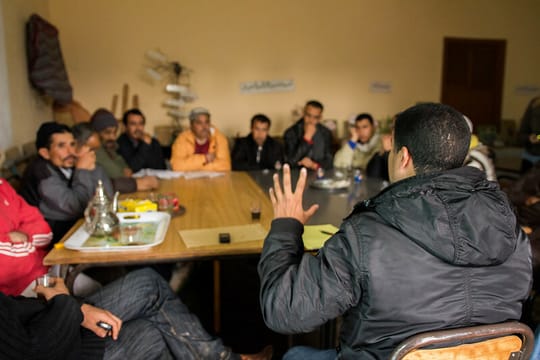PARTICIPATORY DEVELOPMENT: THE APPLICATION OF A THEORY

By Zaynab Osman
Intern
Center for Community Consensus and Sustainable Development
High Atlas Foundation
 A month ago, participatory development was the title of a chapter in my development textbook, the name of a series of lectures I had attended at university, or the topic of an essay I had written; just theory. Nonetheless, it was a theory that I had been told worked. It is said that ‘seeing is believing’ and after a month of interning with the Center for Community Consensus-Building and Sustainable Development, I am convinced not only of the fact that participatory development works, but that it promotes true sustainable development: the ultimate goal of any development initiative.
A month ago, participatory development was the title of a chapter in my development textbook, the name of a series of lectures I had attended at university, or the topic of an essay I had written; just theory. Nonetheless, it was a theory that I had been told worked. It is said that ‘seeing is believing’ and after a month of interning with the Center for Community Consensus-Building and Sustainable Development, I am convinced not only of the fact that participatory development works, but that it promotes true sustainable development: the ultimate goal of any development initiative.
Last Saturday I was fortunate enough to attend a training session in the urban commune of AinHarrouda which was facilitated by, Program Director, Mouhssine Tadlaoui-Cherki. As part of the training, Mouhssine defined the concept of participatory development to the representatives of 37 different Civil Society Organisations (CSOs) and described that it comes in four different forms:
1) passive participation: a form of charity in which beneficiaries are only made aware about the occurrence of a project; 2) participation by consultation: beneficiaries are not included in any decision making but are given the opportunity to voice their opinion or may be involved in labour; 3) participation by collaboration: beneficiaries’ involvement is for the satisfaction of the donors thus any discussions or analysis is based on predetermined objectives; and 4) empowerment participation: ownership and control of the development process rests in the hands of beneficiaries who are capable and willing. Taking into consideration that this was only the first training session with the community in AinHarrouda and that 37 CSOs were present, it was easy for me to identify that the form of participatory development used by the HAF is the one that is the most inclusive: empowerment participation.
One of the many things which I commend about the HAF is that there is no pretense or illusion of the fact that participatory approaches to development are not without their challenges. As one can assume, the greater the number of people involved in decision making the larger the variety of differing opinions which make it difficult for community consensus to be reached. This means the process of development may take longer than, for example, a top-down approach however there is great reward in being patient. The project will have included the vital local knowledge of the beneficiaries at every stage of development: research, project design, implementation and evaluation, and consequently it is more likely to be accepted by the beneficiaries and thus ensures sustainability.
I would like to take this opportunity to thank Mouhssine, Safae Lacheheb, Younes Khitouch, the Faculty of Law, Economics and Social Sciences of University Hassan II, everyone involved in the work of the HA, and the community of the province of Mohammedia for truly making this an enlightening and memorable experience; one that has allowed me to develop both personally and professionally.
Unfortunately, however, all good things must come to an end and so does my time in Morocco. I have learned a lot in my four weeks here, but arguably the most significant thing that this experience has taught me is that theory is just rhetoric; only once it is applied does it have any true substance. Therefore, I will endeavour to apply everything I learnt about myself and about development to my personal and professional life, in order to ensure the success of my internship.
I wish the HAF all the best in their work, and I bid you all goodbye but not farewell, or perhaps مع السلامة would be a more appropriate greeting!